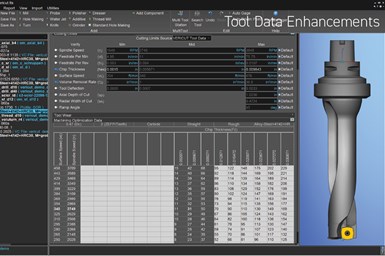Vericut 9.4 Offers Increased Connectivity Across Manufacturing Workflow
The latest version features a new module, CNC Machine Monitoring, which connects Vericut directly to CNC machines and streams data to enable users to monitor what their machines are doing on the shop floor, live in real time.

Photo Credit: CGTech
CGTech’s Vericut 9.4 offers improvements within the core product and focuses on increased connectivity across the manufacturing workflow, enabling organizations to do more with the resources they already have.
Vericut provides machine simulation, verification and optimization for all types of CNC machine processes, including metal cutting, additive and hybrid manufacturing, composites and more. It is an independent, standalone software that supports integrations with all leading CAM and tool management systems.
“The release of 9.4 focuses on improving what makes Vericut a powerful tool, while enabling customers to connect both new and existing technologies across their manufacturing ecosystem,” says Gene Granata, CGTech’s director of product management. “The improvements and new capabilities within Vericut enable teams involved across manufacturing to work more efficiently and intelligently, while simultaneously enabling higher competency levels for machinists and NC programmers.”
Vericut 9.4 introduces a new module, CNC Machine Monitoring, which connects Vericut directly to CNC machines and streams data to enable users to monitor what their machines are doing on the shop floor, live in real time. Users can see which NC program or subroutine is running, monitor machine motions and spindle activity, see if overrides have been applied to spindle or feed rates, identify when machining has been interrupted by emergency stops or taken out of productive cycle mode, and much more, all within Vericut.
CNC Precheck is a new standalone application that enables machinists to ensure that key aspects of the machine setup match what was verified in Vericut. This final pre-check before machining enables differences to be identified such as NC programs that are the wrong version or contain edits, missing and/or different work or tool offsets, so these can be investigated and resolved before running the machine.
All Vericut users, even those without the Force optimization module, benefit from streamlined optimization enhancements in setup and predetermined Tool Data settings to quickly optimize NC programs. Starting optimization values for materials and other cutting data is available in Vericut to give users more confidence in how their NC programs will be used in machining, or for use in optimization to create optimized NC programs that will perform better.
File sizes for the free, downloadable Vericut Reviewer Application have been reduced by 50% or more for shorter load/save times, and easier transport to other departments. Machinists, engineers and quality assurance teams can more easily review NC programs and measure part features.
Vericut’s Tool Data has been expanded to include more types of cutters, including ceramic, HSS and serrated edge types, with even more on the way in coming releases. With just one click, the “Provide New Default Tool Data” feature provides industry standard cutting data for all cutters (or inserts) for most common stock materials, enabling users to easily adjust tool data such as cutting limits and more, and verify that tools are being used within acceptable ranges.
Users can access tool and cutting data from over 40 tooling vendors using the ToolsUnited interface. Directly read 3D tool assemblies and their cutting data for use in Vericut simulation and optimization.
Related Content
Precision Machining Technology Review: December 2023
Production Machining’s December 2023 technology showcase includes some of the latest technology from Sandvik Coromant, Nikon Metrology, The L.S. Starrett Co., Walter USA, Kennametal and SolidCAM.
Read MoreWho Are the DFM Consultants? You Are.
Modern shops are bolstering their engineering staff to better offer design for manufacturability advice to their customers. Here, one industry expert suggests ways to develop a common language between manufacturing and engineering.
Read MoreLone Shop Machinist Benefits From Five-Axis CAM Modules
This California shop owner applies five-axis strategies for more efficient milling of parts with challenging geometries, free-form surfaces and deep cavities.
Read MoreMastercam 2024 Integrates Sandvik Coromant CoroPlus Tool Library
The integrated library enables users to work faster when importing tool geometries and cutting data.
Read MoreRead Next
A Tooling Workshop Worth a Visit
Marubeni Citizen-Cincom’s tooling and accessory workshop offers a chance to learn more about ancillary devices that can boost machining efficiency and capability.
Read MoreEmerging Leaders Nominations Now Open
Here’s your chance to highlight a young person in your manufacturing business who is on the path to be a future leader moving your company forward.
Read MoreDo You Have Single Points of Failure?
Plans need to be in place before a catastrophic event occurs.
Read More














.jpg;maxWidth=300;quality=90)









